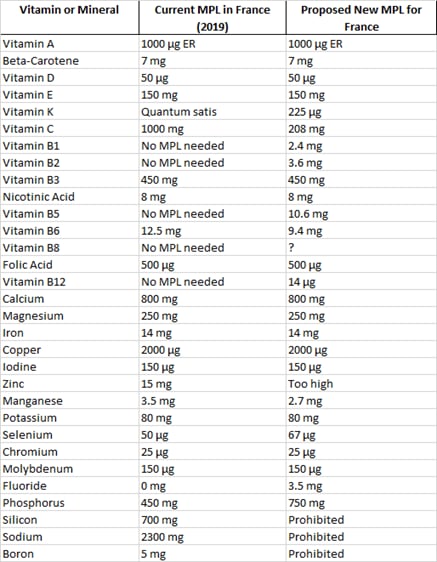Maximum levels for vitamins and minerals (MPL) in food supplements and other foods are set individually by EU Member States. While there exists an EU working group that is exploring the potential to harmonize the levels, there is still no agreement at the EU levels, and France is now pushing forward with some significant changes.
The process began when the new French regulator (DGAL) asked the French risk assessment body (ANSES) for an opinion in 2023. ANSES published its proposals earlier this year.
“Shocklingly, some of the new limits are not based on safety, but on amounts in the diet, ignoring EU law and raising questions as to whether France intends to take exception from a cornerstone of the EU, the principle of mutual recognition,” Luca Bucchini, Managing Director of Hylobates Consulting Srl, told NutraIngredients.
“Significantly. proposed levels - despite no evidence of safety issues - are much lower than current ones, and of those in the Member States of the EU that have such levels,” he added.
Downs and ups
There are some eyebrow-raising changes being proposed, noted Bucchini, with the proposed limit for Vitamin C to be dramatically reduced from 1,000 mg to 208 mg, representing a decrease of 79.2%. “Ominously this is not based on risk assessment,” he noted.
Among the B vitamins, France is proposing to reduce the maximum permitted level (MPL) for Vitamin B6 by almost 25%, from 12.5 mg to 9.4 mg. New limits of 2.4 mg, 3.6 mg, and 10.6 mg are also proposed for Vitamins B1, B2, and B6 respectively. However, Bucchini noted that there were previously no MPLs for these vitamins. For Vitamin B12, a new 14 microgram limit is being proposed, which Bucchini describes as “extremely low considering Italy’s limit of 1,000 micrograms”.
Another nutrient without an existing MPL is vitamin K, and France is now proposing an MPL of 225 micrograms, he said.
Decreases are also being proposed for zinc (reduced to 9.7 mg per day), and manganese (decrease from 3.5 mg to 2.7 mg).
But it’s not all decreases, said Bucchini, with proposals to raise the limit for Selenium 50 micrograms to 67 micrograms (a 34% increase). In addition, there’s also a proposal to increase the MPL for phosphorus from 450 mg to 750 mg.
What’s next?
According to EU law, when Member States draft technical regulations, they must notify the EU Commission before they are adopted into national law. This allows the Commission and other countries to assess the proposals for potential technical barriers to trade during a three month “standstill” period.
“This is now going to the so-called TRIS process with the EU, but the French seem determined,” said Bucchini.


